新概念第二册Lesson 55 Not a gold mine讲义
文档属性
| 名称 | 新概念第二册Lesson 55 Not a gold mine讲义 | 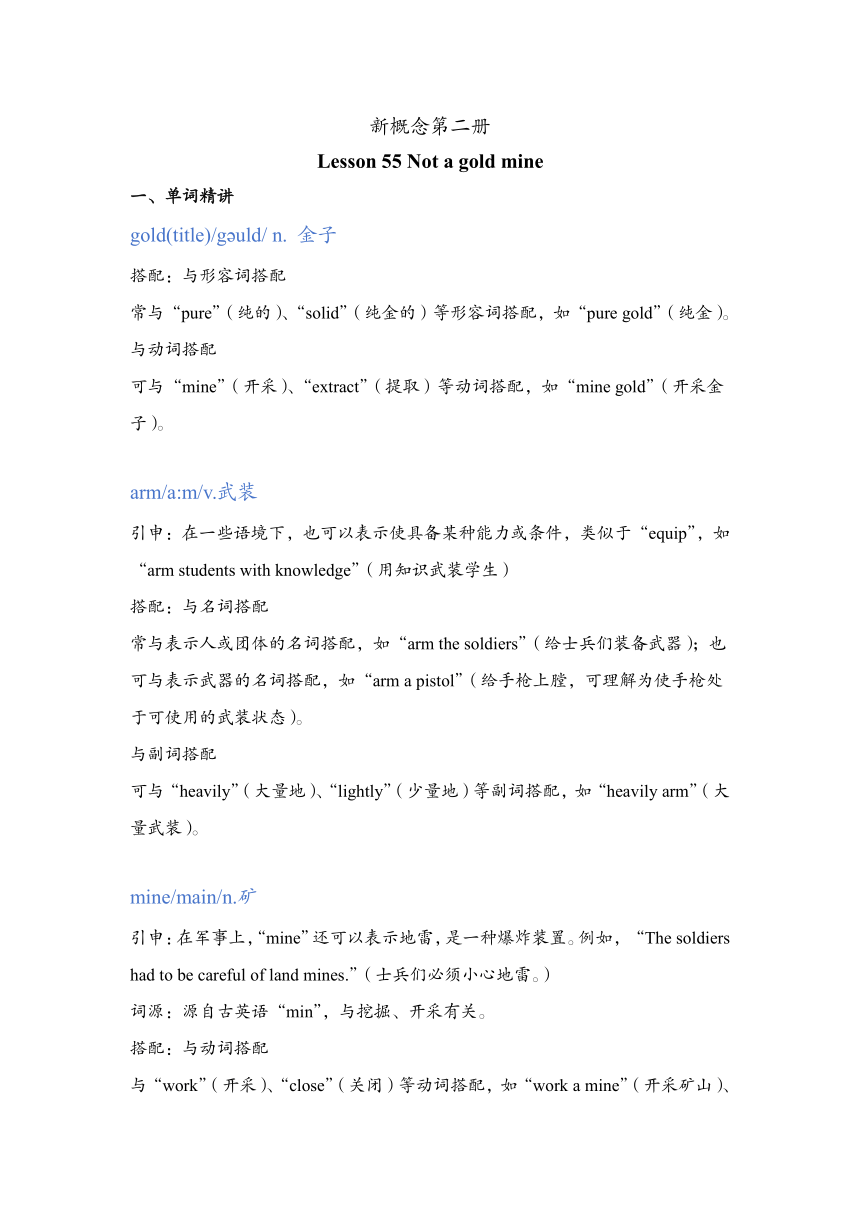 | |
| 格式 | docx | ||
| 文件大小 | 148.3KB | ||
| 资源类型 | 教案 | ||
| 版本资源 | 新概念英语 | ||
| 科目 | 英语 | ||
| 更新时间 | 2024-11-23 20:50:20 | ||
图片预览

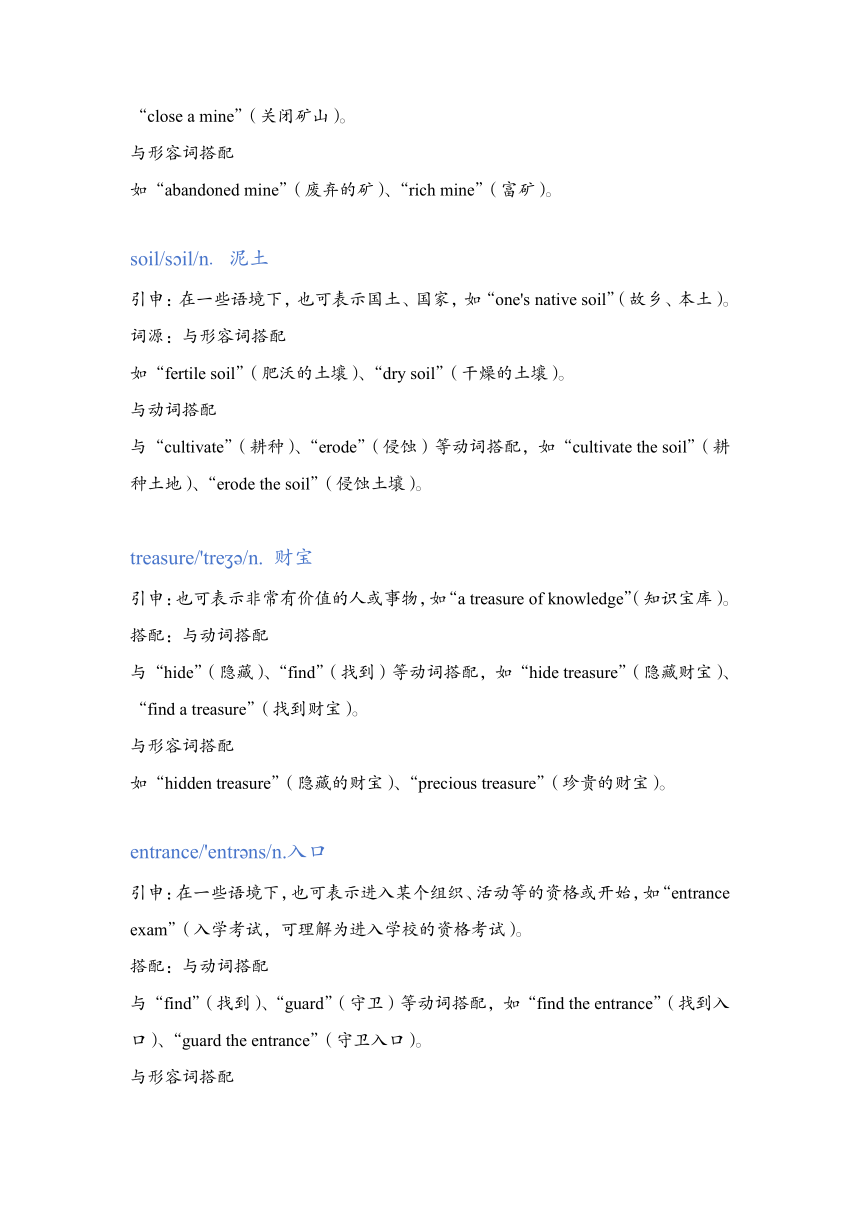
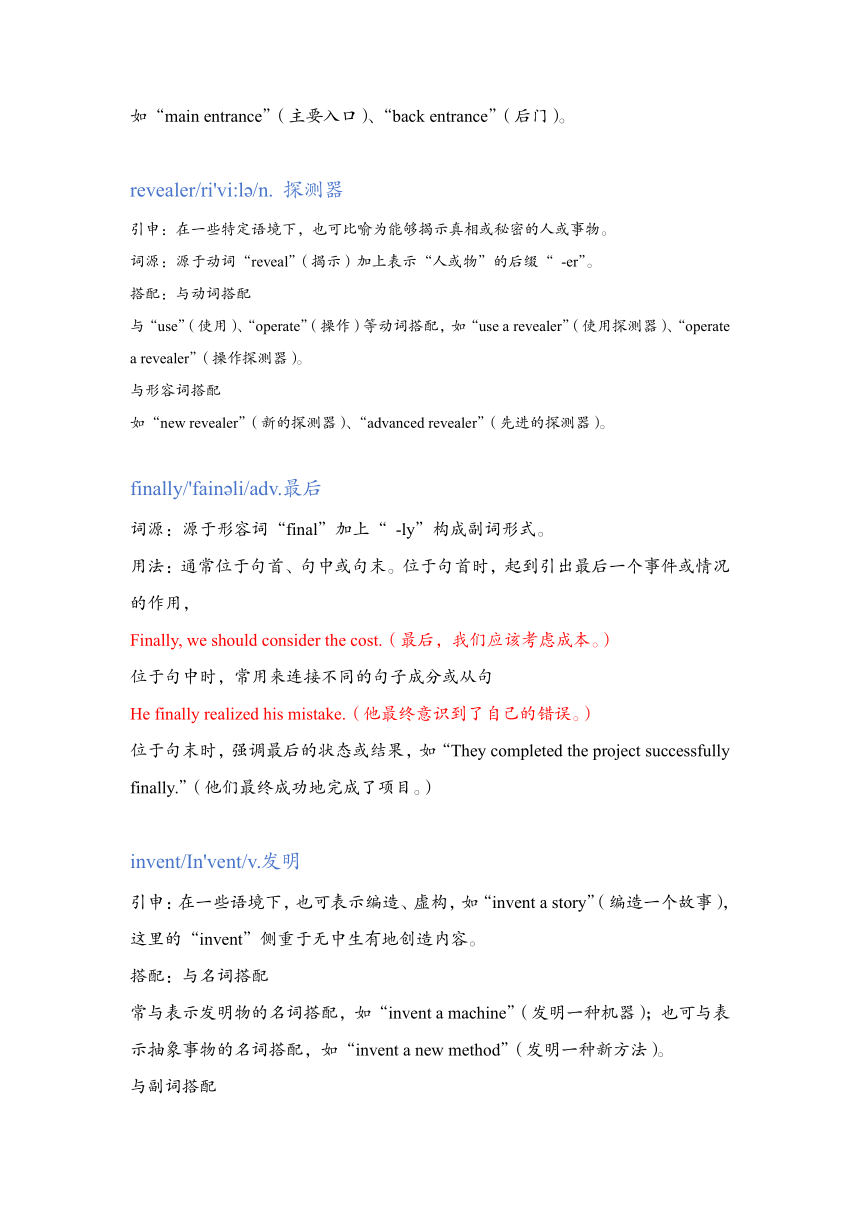
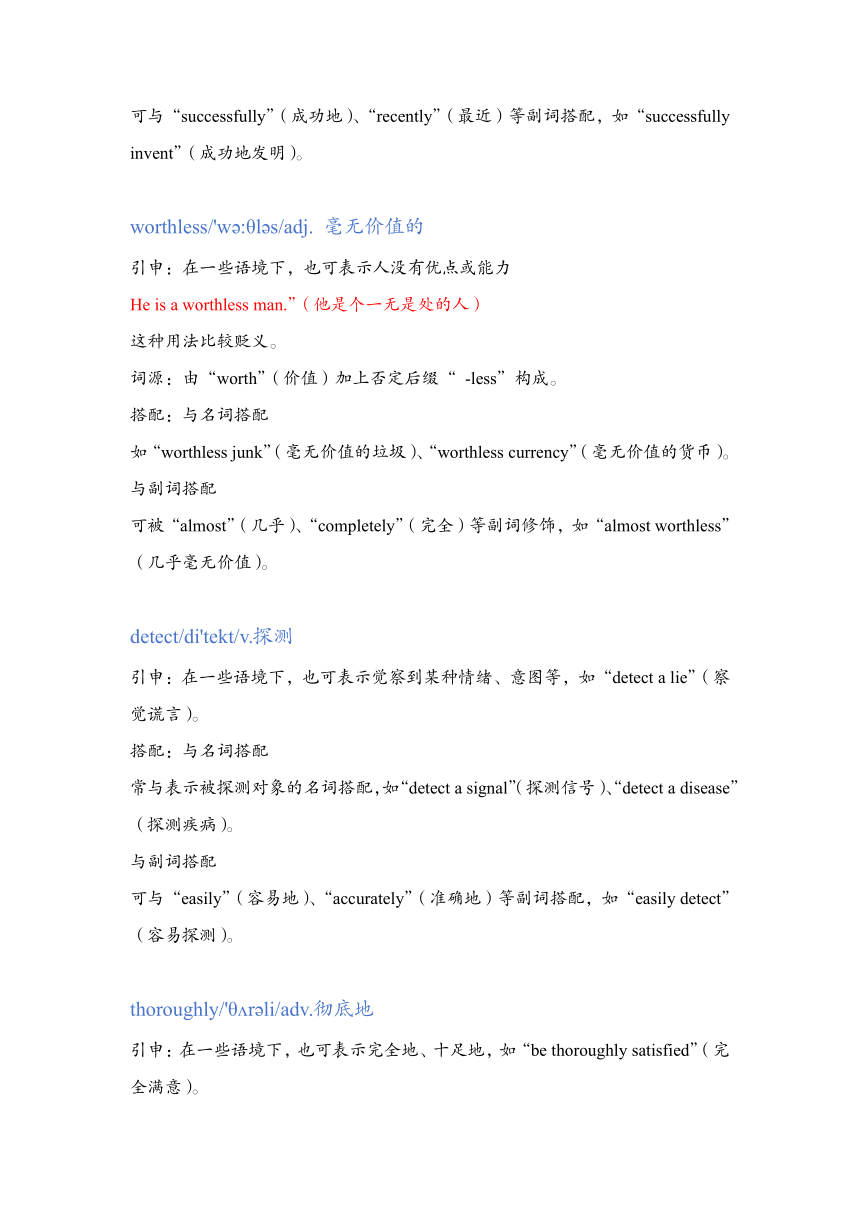
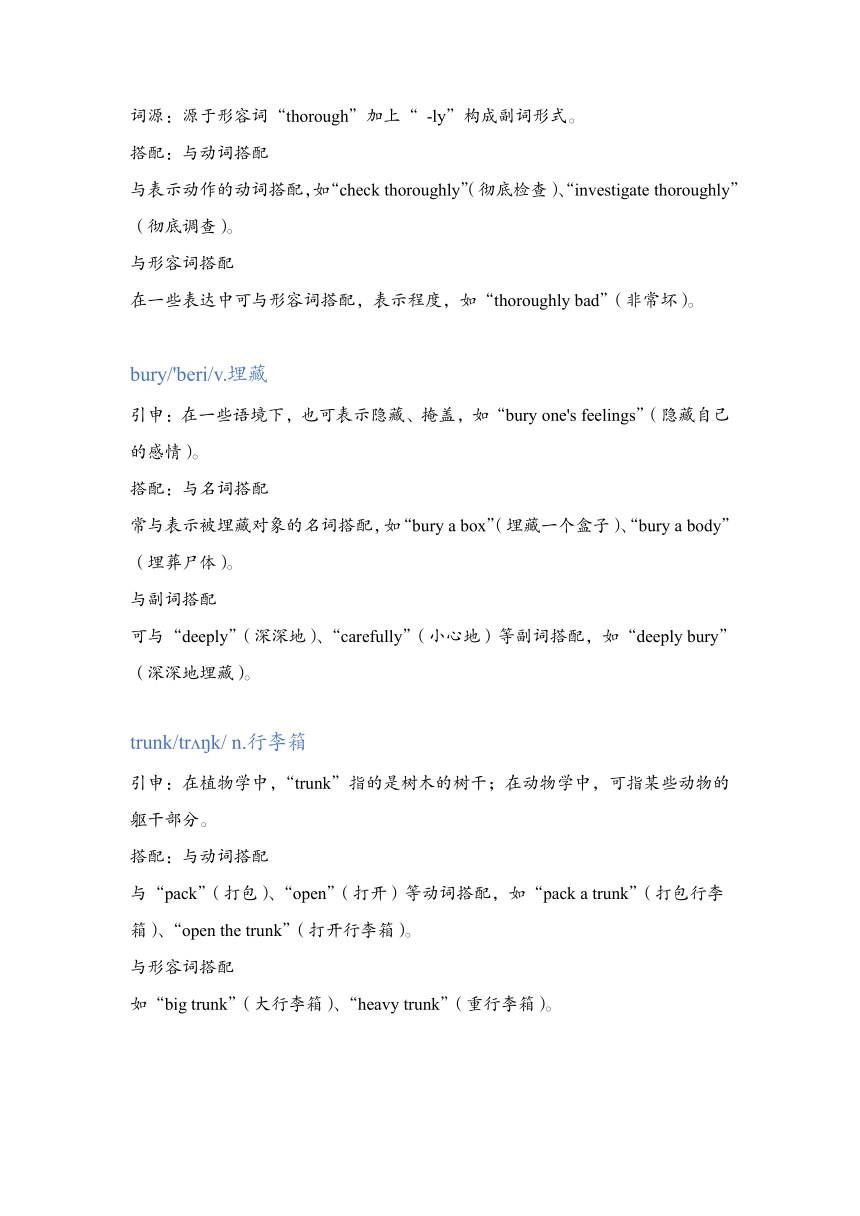
文档简介
新概念第二册
Lesson 55 Not a gold mine
单词精讲
gold(title)/g uld/ n. 金子
搭配:与形容词搭配
常与“pure”(纯的)、“solid”(纯金的)等形容词搭配,如“pure gold”(纯金)。
与动词搭配
可与“mine”(开采)、“extract”(提取)等动词搭配,如“mine gold”(开采金子)。
arm/a:m/v.武装
引申:在一些语境下,也可以表示使具备某种能力或条件,类似于“equip”,如“arm students with knowledge”(用知识武装学生)
搭配:与名词搭配
常与表示人或团体的名词搭配,如“arm the soldiers”(给士兵们装备武器);也可与表示武器的名词搭配,如“arm a pistol”(给手枪上膛,可理解为使手枪处于可使用的武装状态)。
与副词搭配
可与“heavily”(大量地)、“lightly”(少量地)等副词搭配,如“heavily arm”(大量武装)。
mine/main/n.矿
引申:在军事上,“mine”还可以表示地雷,是一种爆炸装置。例如, “The soldiers had to be careful of land mines.”(士兵们必须小心地雷。)
词源:源自古英语“min”,与挖掘、开采有关。
搭配:与动词搭配
与“work”(开采)、“close”(关闭)等动词搭配,如“work a mine”(开采矿山)、“close a mine”(关闭矿山)。
与形容词搭配
如“abandoned mine”(废弃的矿)、“rich mine”(富矿)。
soil/s il/n.泥土
引申:在一些语境下,也可表示国土、国家,如“one's native soil”(故乡、本土)。
词源:与形容词搭配
如“fertile soil”(肥沃的土壤)、“dry soil”(干燥的土壤)。
与动词搭配
与“cultivate”(耕种)、“erode”(侵蚀)等动词搭配,如“cultivate the soil”(耕种土地)、“erode the soil”(侵蚀土壤)。
treasure/'tre /n. 财宝
引申:也可表示非常有价值的人或事物,如“a treasure of knowledge”(知识宝库)。
搭配:与动词搭配
与“hide”(隐藏)、“find”(找到)等动词搭配,如“hide treasure”(隐藏财宝)、“find a treasure”(找到财宝)。
与形容词搭配
如“hidden treasure”(隐藏的财宝)、“precious treasure”(珍贵的财宝)。
entrance/'entr ns/n.入口
引申:在一些语境下,也可表示进入某个组织、活动等的资格或开始,如“entrance exam”(入学考试,可理解为进入学校的资格考试)。
搭配:与动词搭配
与“find”(找到)、“guard”(守卫)等动词搭配,如“find the entrance”(找到入口)、“guard the entrance”(守卫入口)。
与形容词搭配
如“main entrance”(主要入口)、“back entrance”(后门)。
revealer/ri'vi:l /n. 探测器
引申:在一些特定语境下,也可比喻为能够揭示真相或秘密的人或事物。
词源:源于动词“reveal”(揭示)加上表示“人或物”的后缀“ -er”。
搭配:与动词搭配
与“use”(使用)、“operate”(操作)等动词搭配,如“use a revealer”(使用探测器)、“operate a revealer”(操作探测器)。
与形容词搭配
如“new revealer”(新的探测器)、“advanced revealer”(先进的探测器)。
finally/'fain li/adv.最后
词源:源于形容词“final”加上“ -ly”构成副词形式。
用法:通常位于句首、句中或句末。位于句首时,起到引出最后一个事件或情况的作用,
Finally, we should consider the cost.(最后,我们应该考虑成本。)
位于句中时,常用来连接不同的句子成分或从句
He finally realized his mistake.(他最终意识到了自己的错误。)
位于句末时,强调最后的状态或结果,如“They completed the project successfully finally.”(他们最终成功地完成了项目。)
invent/In'vent/v.发明
引申:在一些语境下,也可表示编造、虚构,如“invent a story”(编造一个故事),这里的“invent”侧重于无中生有地创造内容。
搭配:与名词搭配
常与表示发明物的名词搭配,如“invent a machine”(发明一种机器);也可与表示抽象事物的名词搭配,如“invent a new method”(发明一种新方法)。
与副词搭配
可与“successfully”(成功地)、“recently”(最近)等副词搭配,如“successfully invent”(成功地发明)。
worthless/'w :θl s/adj. 毫无价值的
引申:在一些语境下,也可表示人没有优点或能力
He is a worthless man.”(他是个一无是处的人)
这种用法比较贬义。
词源:由“worth”(价值)加上否定后缀“ -less”构成。
搭配:与名词搭配
如“worthless junk”(毫无价值的垃圾)、“worthless currency”(毫无价值的货币)。
与副词搭配
可被“almost”(几乎)、“completely”(完全)等副词修饰,如“almost worthless”(几乎毫无价值)。
detect/di'tekt/v.探测
引申:在一些语境下,也可表示觉察到某种情绪、意图等,如“detect a lie”(察觉谎言)。
搭配:与名词搭配
常与表示被探测对象的名词搭配,如“detect a signal”(探测信号)、“detect a disease”(探测疾病)。
与副词搭配
可与“easily”(容易地)、“accurately”(准确地)等副词搭配,如“easily detect”(容易探测)。
thoroughly/'θ r li/adv.彻底地
引申:在一些语境下,也可表示完全地、十足地,如“be thoroughly satisfied”(完全满意)。
词源:源于形容词“thorough”加上“ -ly”构成副词形式。
搭配:与动词搭配
与表示动作的动词搭配,如“check thoroughly”(彻底检查)、“investigate thoroughly”(彻底调查)。
与形容词搭配
在一些表达中可与形容词搭配,表示程度,如“thoroughly bad”(非常坏)。
bury/'beri/v.埋藏
引申:在一些语境下,也可表示隐藏、掩盖,如“bury one's feelings”(隐藏自己的感情)。
搭配:与名词搭配
常与表示被埋藏对象的名词搭配,如“bury a box”(埋藏一个盒子)、“bury a body”(埋葬尸体)。
与副词搭配
可与“deeply”(深深地)、“carefully”(小心地)等副词搭配,如“deeply bury”(深深地埋藏)。
trunk/tr k/ n.行李箱
引申:在植物学中,“trunk”指的是树木的树干;在动物学中,可指某些动物的躯干部分。
搭配:与动词搭配
与“pack”(打包)、“open”(打开)等动词搭配,如“pack a trunk”(打包行李箱)、“open the trunk”(打开行李箱)。
与形容词搭配
如“big trunk”(大行李箱)、“heavy trunk”(重行李箱)。
cave/keiv/n.山洞
引申:在一些语境下,也可表示类似山洞的封闭空间或隐蔽之处。
搭配:与动词搭配
与“enter”(进入)、“explore”(探索)等动词搭配,如“enter a cave”(进入山洞)、“explore a cave”(探索山洞)。
与形容词搭配
如“deep cave”(深山洞)、“dark cave”(黑暗的山洞)。
confident/'k nfid nt/adj.有信心的
引申:在一些语境下,也可表示对他人或事物有信心,如“be confident in a friend”(对朋友有信心)。
搭配:与介词搭配
常与“about”(关于)、“in”(在……方面)等介词搭配,如“confident about the future”(对未来有信心
seashore/'si:' :/n. 海岸
引申:在一些语境下,也可指沿海的地区或城市,如“seashore towns”(海滨城镇)。
词源:由“sea”(海洋)和“shore”(岸)组合而成。
搭配:与动词搭配
常与“walk”(散步)、“run”(跑步)、“explore”(探索)等动词搭配,如“run along the seashore”(沿着海岸跑步)。
与形容词搭配
如“beautiful seashore”(美丽的海岸)、“rocky seashore”(多岩石的海岸)。
value/'v lju:/n.价值
引申:在哲学、社会学等领域,也可指价值观、价值体系等抽象概念,如“moral values”(道德价值观)。
搭配:与动词搭配
与“assess”(评估)、“increase”(增加)、“decrease”(减少)等动词搭配,如“assess the value of a property”(评估一处房产的价值)。
与形容词搭配
如“high value”(高价值)、“low value”(低价值)、“intrinsic value”(内在价值)。
pirate/'pai r t/n.海盗
引申:在现代语境下,也可指侵犯版权、专利等的人,如“software pirates”(软件盗版者)。
搭配:与动词搭配
与“attack”(攻击)、“plunder”(掠夺)、“raid”(突袭)等动词搭配,如“pirates raid a coastal village”(海盗突袭一个沿海村庄)。
与形容词搭配
如“fierce pirate”(凶猛的海盗)、“notorious pirate”(臭名昭著的海盗)。
重点句型
表示过去习惯性动作
当我们提到过去某一特定时间时, 我们有时可用would来代替used to,有时则不可以,而且would需要指出具体时间,used to则不需要。
当used to暗示与现在的对照时,不可用would替换:
I used to drink heavily, but I have given up drinking now.
I never used to eat a large breakfast, but I do now.
当used to描写过去的状态时,也不可与would互换,would只表示过去特有的习惯或行为:
This sort of novel used to be very popular. 这种小说过去很流行.
I used to be a waiter, but now I’m a taxi-driver.
当used to不强调与现在的对比时,可与would互换。但一个故事开头时不用would,必须首先用一般过去时或used to描述背景,然后用would表示习惯性动作:
When I was a boy we always spent/used to spend our holidays on a farm. We would get up at 5 and we would help milk the cows.
use, be used to, used to
use vt. 用,使用,运用,应用
May I use your dictionary/car
I don’t know how to use the word.
be used to 习惯于(后面跟名词或动名词,be也可用get等代替)
I soon got used to getting up early when I started working as a baker.
I’m used to shopping alone.
used to 过去习惯……(表示过去有而现在通常已不存在的习惯,只用于一般过去时,后面只能跟动词不定式)
I used to get up early when I worked as a baker, but I don’t have to get up early now.
You didn’t use to smoke
课文精讲
Dreams of finding lost treasure almost came true recently.
最近,找到失踪宝藏的梦想差一点变成了现实。
★dream n. 梦;v. 做梦
① n. 梦想
dreams come true 梦想成真
dreams ended 梦想破灭了, 梦断了
dream of … ……的梦
Dream of flying in the sky comes true.
② v. 做梦
dream of doing sth.
I dream of flying in the sky.(dream v)
come true 变成现实,(预言、期望等)成为事实,(愿意)实现
His dream to travel around the world at last came true.
A new machine called 'The Revealer' has been invented and it has been used to detect gold which has been buried in the ground.
一种叫“探宝器”的新机器已经发明出来,并被人们用来探测地下埋藏的金子。
一句话中只有一个动词, 如果再出现动词, 可以用and并列连接, 也可以变成复合句, 用when, because连接, 还可以使这个动词表示动词意思, 但不做谓语, 即非谓语动词
过去分词做定语, 表示 “被”,如ploughed field
n. +called 被称之为……的……(如果用短语修饰其他词, 则把短语放在被修饰词的后边)
the plane called a “Pilatus Porter”
be used to do sth. 被用来……
used to do 过去常常
同位语从句中的引导词只有一个that,不会用which
in the ground (更习惯于用 “under the ground” )
The machine was used in a cave near the seashore where -- it is said -- pirates used to hide gold.
在靠近海边的一个据说过去海盗常在里面藏金子的岩洞里。
it is said是插入语,当“据说”讲。
where = in which翻译时译为 “在那儿”,修饰 cave;一个地点状语从句
This is the river where I swim.
The pirates would often bury gold in the cave and then fail to collect it.
海盗们过去常把进自埋藏在那个洞里,可后来却没能取走。
would表示过去的习惯性动作, 但此处表示 “used to” 过去常做
fail to do sth. 未能、不能、忘记做某事项 (fail后面接动词不定式表示否定)
He failed to see the reason why they sent him away.
collect的含义之一为“(去)取,接”
Don’t fail to collect me before you go to the party.
I’ll collect my post on my way home.
Armed with the new machine, a search party went into the cave hoping to find buried treasure.
一支用这种新机器装备起来的探宝队进入了这个岩洞,希望找到埋藏着的金子。
如果几个句子的主语是同一事物, 则可以把几个句子合并为一个句子。保留一个句子做主句, 其他的变成非谓语动词。非谓语动词采用何种形式, 则根据其与主语的关系, 如果是主动关系, 用-ing, 被动关系, 则用动词的-ed形式
主句与其他句子的位置安排要保持句子的平衡, 还要注意动作的连贯
The boy went home. The boy was crying. The boy was beaten.
=Beaten by sb, the boy went home, crying.
arm(ed) with 可以表示“带着、装着、穿着”等
Don’t worry. I’m armed with an umbrella.
You’d better arm yourself with a warm coat.
Very excited, the party dug a hole two feel deep.
队员们异常激动,就地挖了一个两英尺深的坑。
Very exciting, … 形容词短语做状语
Tired of sleeping on the floor, …
Tired, I went home./ I went home tired.句子顺序不同, 表达的意思也不同
two feet deep“数词+量词+形容词”结构可以做定语;也可以做表语
I am five years old.
The street is five meters wide.
long/wide/high/deep,人有多高用 “tall”
In spite of this, many people are confident that 'The Revealer' may reveal something of value fairly soon.
尽管如此,很多人仍然相信“探宝器”很快就会探出值钱的东西来。
in spite of / though / even if 尽管
something of value
of表示其所修饰的名词具有某种性质、状况,of加名词往往让人联想这名词对应的形容词
The news is of great importance to us.
of value=valuable 有价值的
of small value 价值很小(= almost worthless)
形容词要放在不定代词的后边
something important =something of importance
someone patient =someone of patience
Lesson 55 Not a gold mine
单词精讲
gold(title)/g uld/ n. 金子
搭配:与形容词搭配
常与“pure”(纯的)、“solid”(纯金的)等形容词搭配,如“pure gold”(纯金)。
与动词搭配
可与“mine”(开采)、“extract”(提取)等动词搭配,如“mine gold”(开采金子)。
arm/a:m/v.武装
引申:在一些语境下,也可以表示使具备某种能力或条件,类似于“equip”,如“arm students with knowledge”(用知识武装学生)
搭配:与名词搭配
常与表示人或团体的名词搭配,如“arm the soldiers”(给士兵们装备武器);也可与表示武器的名词搭配,如“arm a pistol”(给手枪上膛,可理解为使手枪处于可使用的武装状态)。
与副词搭配
可与“heavily”(大量地)、“lightly”(少量地)等副词搭配,如“heavily arm”(大量武装)。
mine/main/n.矿
引申:在军事上,“mine”还可以表示地雷,是一种爆炸装置。例如, “The soldiers had to be careful of land mines.”(士兵们必须小心地雷。)
词源:源自古英语“min”,与挖掘、开采有关。
搭配:与动词搭配
与“work”(开采)、“close”(关闭)等动词搭配,如“work a mine”(开采矿山)、“close a mine”(关闭矿山)。
与形容词搭配
如“abandoned mine”(废弃的矿)、“rich mine”(富矿)。
soil/s il/n.泥土
引申:在一些语境下,也可表示国土、国家,如“one's native soil”(故乡、本土)。
词源:与形容词搭配
如“fertile soil”(肥沃的土壤)、“dry soil”(干燥的土壤)。
与动词搭配
与“cultivate”(耕种)、“erode”(侵蚀)等动词搭配,如“cultivate the soil”(耕种土地)、“erode the soil”(侵蚀土壤)。
treasure/'tre /n. 财宝
引申:也可表示非常有价值的人或事物,如“a treasure of knowledge”(知识宝库)。
搭配:与动词搭配
与“hide”(隐藏)、“find”(找到)等动词搭配,如“hide treasure”(隐藏财宝)、“find a treasure”(找到财宝)。
与形容词搭配
如“hidden treasure”(隐藏的财宝)、“precious treasure”(珍贵的财宝)。
entrance/'entr ns/n.入口
引申:在一些语境下,也可表示进入某个组织、活动等的资格或开始,如“entrance exam”(入学考试,可理解为进入学校的资格考试)。
搭配:与动词搭配
与“find”(找到)、“guard”(守卫)等动词搭配,如“find the entrance”(找到入口)、“guard the entrance”(守卫入口)。
与形容词搭配
如“main entrance”(主要入口)、“back entrance”(后门)。
revealer/ri'vi:l /n. 探测器
引申:在一些特定语境下,也可比喻为能够揭示真相或秘密的人或事物。
词源:源于动词“reveal”(揭示)加上表示“人或物”的后缀“ -er”。
搭配:与动词搭配
与“use”(使用)、“operate”(操作)等动词搭配,如“use a revealer”(使用探测器)、“operate a revealer”(操作探测器)。
与形容词搭配
如“new revealer”(新的探测器)、“advanced revealer”(先进的探测器)。
finally/'fain li/adv.最后
词源:源于形容词“final”加上“ -ly”构成副词形式。
用法:通常位于句首、句中或句末。位于句首时,起到引出最后一个事件或情况的作用,
Finally, we should consider the cost.(最后,我们应该考虑成本。)
位于句中时,常用来连接不同的句子成分或从句
He finally realized his mistake.(他最终意识到了自己的错误。)
位于句末时,强调最后的状态或结果,如“They completed the project successfully finally.”(他们最终成功地完成了项目。)
invent/In'vent/v.发明
引申:在一些语境下,也可表示编造、虚构,如“invent a story”(编造一个故事),这里的“invent”侧重于无中生有地创造内容。
搭配:与名词搭配
常与表示发明物的名词搭配,如“invent a machine”(发明一种机器);也可与表示抽象事物的名词搭配,如“invent a new method”(发明一种新方法)。
与副词搭配
可与“successfully”(成功地)、“recently”(最近)等副词搭配,如“successfully invent”(成功地发明)。
worthless/'w :θl s/adj. 毫无价值的
引申:在一些语境下,也可表示人没有优点或能力
He is a worthless man.”(他是个一无是处的人)
这种用法比较贬义。
词源:由“worth”(价值)加上否定后缀“ -less”构成。
搭配:与名词搭配
如“worthless junk”(毫无价值的垃圾)、“worthless currency”(毫无价值的货币)。
与副词搭配
可被“almost”(几乎)、“completely”(完全)等副词修饰,如“almost worthless”(几乎毫无价值)。
detect/di'tekt/v.探测
引申:在一些语境下,也可表示觉察到某种情绪、意图等,如“detect a lie”(察觉谎言)。
搭配:与名词搭配
常与表示被探测对象的名词搭配,如“detect a signal”(探测信号)、“detect a disease”(探测疾病)。
与副词搭配
可与“easily”(容易地)、“accurately”(准确地)等副词搭配,如“easily detect”(容易探测)。
thoroughly/'θ r li/adv.彻底地
引申:在一些语境下,也可表示完全地、十足地,如“be thoroughly satisfied”(完全满意)。
词源:源于形容词“thorough”加上“ -ly”构成副词形式。
搭配:与动词搭配
与表示动作的动词搭配,如“check thoroughly”(彻底检查)、“investigate thoroughly”(彻底调查)。
与形容词搭配
在一些表达中可与形容词搭配,表示程度,如“thoroughly bad”(非常坏)。
bury/'beri/v.埋藏
引申:在一些语境下,也可表示隐藏、掩盖,如“bury one's feelings”(隐藏自己的感情)。
搭配:与名词搭配
常与表示被埋藏对象的名词搭配,如“bury a box”(埋藏一个盒子)、“bury a body”(埋葬尸体)。
与副词搭配
可与“deeply”(深深地)、“carefully”(小心地)等副词搭配,如“deeply bury”(深深地埋藏)。
trunk/tr k/ n.行李箱
引申:在植物学中,“trunk”指的是树木的树干;在动物学中,可指某些动物的躯干部分。
搭配:与动词搭配
与“pack”(打包)、“open”(打开)等动词搭配,如“pack a trunk”(打包行李箱)、“open the trunk”(打开行李箱)。
与形容词搭配
如“big trunk”(大行李箱)、“heavy trunk”(重行李箱)。
cave/keiv/n.山洞
引申:在一些语境下,也可表示类似山洞的封闭空间或隐蔽之处。
搭配:与动词搭配
与“enter”(进入)、“explore”(探索)等动词搭配,如“enter a cave”(进入山洞)、“explore a cave”(探索山洞)。
与形容词搭配
如“deep cave”(深山洞)、“dark cave”(黑暗的山洞)。
confident/'k nfid nt/adj.有信心的
引申:在一些语境下,也可表示对他人或事物有信心,如“be confident in a friend”(对朋友有信心)。
搭配:与介词搭配
常与“about”(关于)、“in”(在……方面)等介词搭配,如“confident about the future”(对未来有信心
seashore/'si:' :/n. 海岸
引申:在一些语境下,也可指沿海的地区或城市,如“seashore towns”(海滨城镇)。
词源:由“sea”(海洋)和“shore”(岸)组合而成。
搭配:与动词搭配
常与“walk”(散步)、“run”(跑步)、“explore”(探索)等动词搭配,如“run along the seashore”(沿着海岸跑步)。
与形容词搭配
如“beautiful seashore”(美丽的海岸)、“rocky seashore”(多岩石的海岸)。
value/'v lju:/n.价值
引申:在哲学、社会学等领域,也可指价值观、价值体系等抽象概念,如“moral values”(道德价值观)。
搭配:与动词搭配
与“assess”(评估)、“increase”(增加)、“decrease”(减少)等动词搭配,如“assess the value of a property”(评估一处房产的价值)。
与形容词搭配
如“high value”(高价值)、“low value”(低价值)、“intrinsic value”(内在价值)。
pirate/'pai r t/n.海盗
引申:在现代语境下,也可指侵犯版权、专利等的人,如“software pirates”(软件盗版者)。
搭配:与动词搭配
与“attack”(攻击)、“plunder”(掠夺)、“raid”(突袭)等动词搭配,如“pirates raid a coastal village”(海盗突袭一个沿海村庄)。
与形容词搭配
如“fierce pirate”(凶猛的海盗)、“notorious pirate”(臭名昭著的海盗)。
重点句型
表示过去习惯性动作
当我们提到过去某一特定时间时, 我们有时可用would来代替used to,有时则不可以,而且would需要指出具体时间,used to则不需要。
当used to暗示与现在的对照时,不可用would替换:
I used to drink heavily, but I have given up drinking now.
I never used to eat a large breakfast, but I do now.
当used to描写过去的状态时,也不可与would互换,would只表示过去特有的习惯或行为:
This sort of novel used to be very popular. 这种小说过去很流行.
I used to be a waiter, but now I’m a taxi-driver.
当used to不强调与现在的对比时,可与would互换。但一个故事开头时不用would,必须首先用一般过去时或used to描述背景,然后用would表示习惯性动作:
When I was a boy we always spent/used to spend our holidays on a farm. We would get up at 5 and we would help milk the cows.
use, be used to, used to
use vt. 用,使用,运用,应用
May I use your dictionary/car
I don’t know how to use the word.
be used to 习惯于(后面跟名词或动名词,be也可用get等代替)
I soon got used to getting up early when I started working as a baker.
I’m used to shopping alone.
used to 过去习惯……(表示过去有而现在通常已不存在的习惯,只用于一般过去时,后面只能跟动词不定式)
I used to get up early when I worked as a baker, but I don’t have to get up early now.
You didn’t use to smoke
课文精讲
Dreams of finding lost treasure almost came true recently.
最近,找到失踪宝藏的梦想差一点变成了现实。
★dream n. 梦;v. 做梦
① n. 梦想
dreams come true 梦想成真
dreams ended 梦想破灭了, 梦断了
dream of … ……的梦
Dream of flying in the sky comes true.
② v. 做梦
dream of doing sth.
I dream of flying in the sky.(dream v)
come true 变成现实,(预言、期望等)成为事实,(愿意)实现
His dream to travel around the world at last came true.
A new machine called 'The Revealer' has been invented and it has been used to detect gold which has been buried in the ground.
一种叫“探宝器”的新机器已经发明出来,并被人们用来探测地下埋藏的金子。
一句话中只有一个动词, 如果再出现动词, 可以用and并列连接, 也可以变成复合句, 用when, because连接, 还可以使这个动词表示动词意思, 但不做谓语, 即非谓语动词
过去分词做定语, 表示 “被”,如ploughed field
n. +called 被称之为……的……(如果用短语修饰其他词, 则把短语放在被修饰词的后边)
the plane called a “Pilatus Porter”
be used to do sth. 被用来……
used to do 过去常常
同位语从句中的引导词只有一个that,不会用which
in the ground (更习惯于用 “under the ground” )
The machine was used in a cave near the seashore where -- it is said -- pirates used to hide gold.
在靠近海边的一个据说过去海盗常在里面藏金子的岩洞里。
it is said是插入语,当“据说”讲。
where = in which翻译时译为 “在那儿”,修饰 cave;一个地点状语从句
This is the river where I swim.
The pirates would often bury gold in the cave and then fail to collect it.
海盗们过去常把进自埋藏在那个洞里,可后来却没能取走。
would表示过去的习惯性动作, 但此处表示 “used to” 过去常做
fail to do sth. 未能、不能、忘记做某事项 (fail后面接动词不定式表示否定)
He failed to see the reason why they sent him away.
collect的含义之一为“(去)取,接”
Don’t fail to collect me before you go to the party.
I’ll collect my post on my way home.
Armed with the new machine, a search party went into the cave hoping to find buried treasure.
一支用这种新机器装备起来的探宝队进入了这个岩洞,希望找到埋藏着的金子。
如果几个句子的主语是同一事物, 则可以把几个句子合并为一个句子。保留一个句子做主句, 其他的变成非谓语动词。非谓语动词采用何种形式, 则根据其与主语的关系, 如果是主动关系, 用-ing, 被动关系, 则用动词的-ed形式
主句与其他句子的位置安排要保持句子的平衡, 还要注意动作的连贯
The boy went home. The boy was crying. The boy was beaten.
=Beaten by sb, the boy went home, crying.
arm(ed) with 可以表示“带着、装着、穿着”等
Don’t worry. I’m armed with an umbrella.
You’d better arm yourself with a warm coat.
Very excited, the party dug a hole two feel deep.
队员们异常激动,就地挖了一个两英尺深的坑。
Very exciting, … 形容词短语做状语
Tired of sleeping on the floor, …
Tired, I went home./ I went home tired.句子顺序不同, 表达的意思也不同
two feet deep“数词+量词+形容词”结构可以做定语;也可以做表语
I am five years old.
The street is five meters wide.
long/wide/high/deep,人有多高用 “tall”
In spite of this, many people are confident that 'The Revealer' may reveal something of value fairly soon.
尽管如此,很多人仍然相信“探宝器”很快就会探出值钱的东西来。
in spite of / though / even if 尽管
something of value
of表示其所修饰的名词具有某种性质、状况,of加名词往往让人联想这名词对应的形容词
The news is of great importance to us.
of value=valuable 有价值的
of small value 价值很小(= almost worthless)
形容词要放在不定代词的后边
something important =something of importance
someone patient =someone of patience
同课章节目录
